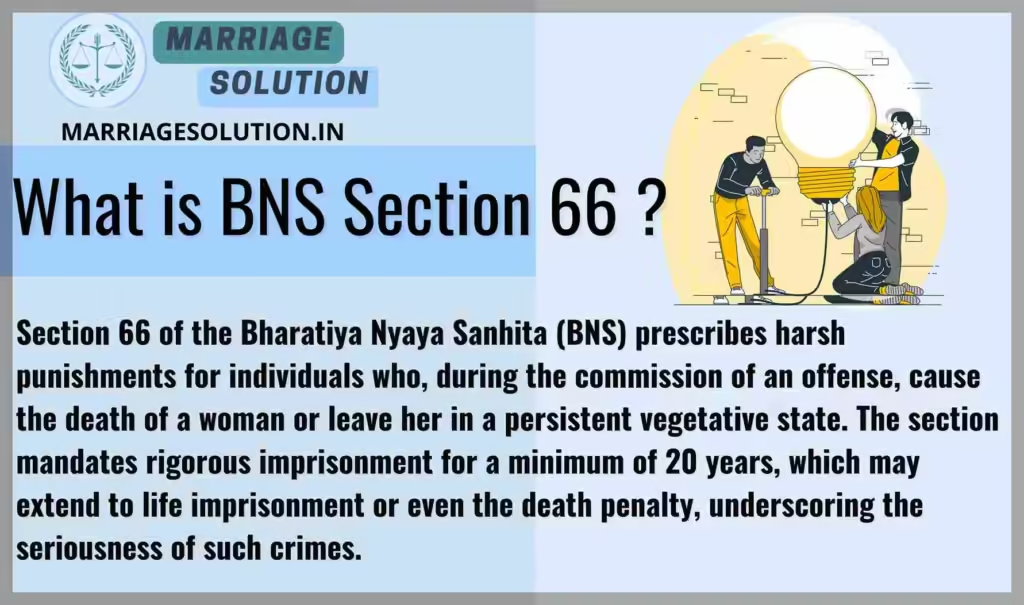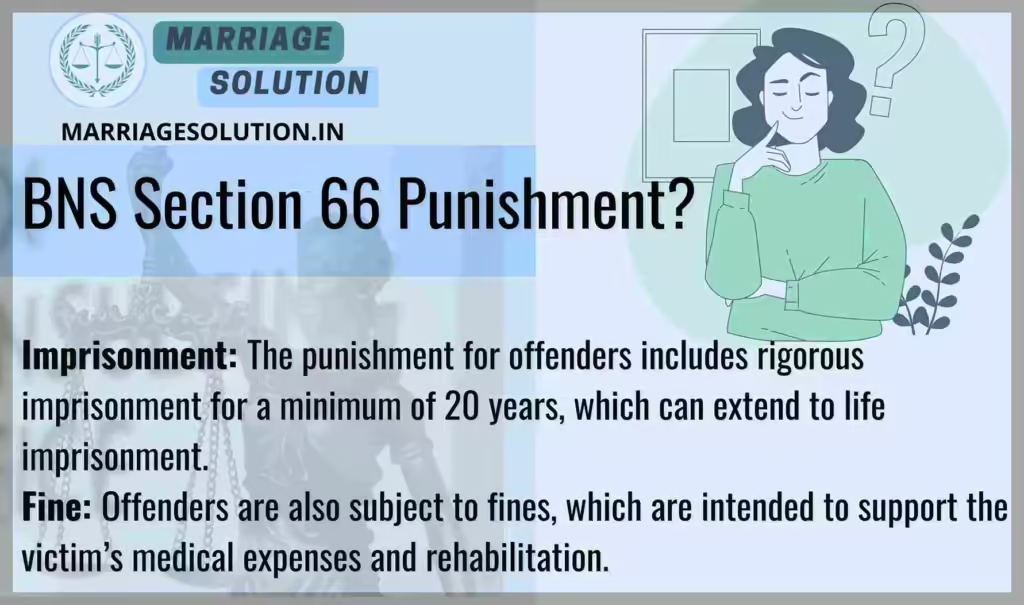Introduction of BNS 66
BNS 66 deals with the punishment for causing death or leaving the victim in a persistent vegetative state during the commission of an offense, particularly under sections related to sexual violence. This section ensures that those who commit such heinous acts face severe consequences, reflecting the law’s commitment to protecting human dignity and life.
The Bharatiya Nyaya Sanhita (BNS) Section 66 replaces the old Indian Penal Code (IPC) Section 376A .
What is section 66 of BNS ?
Section 66 of the Bharatiya Nyaya Sanhita (BNS) prescribes harsh punishments for individuals who, during the commission of an offense, cause the death of a woman or leave her in a persistent vegetative state. The section mandates rigorous imprisonment for a minimum of 20 years, which may extend to life imprisonment or even the death penalty, underscoring the seriousness of such crimes.

BNS Section 66 in Simple Points
BNS Section 65 deals with the offence of gang rape. When two or more persons act together to commit rape, each of them is considered guilty of gang rape, regardless of their individual role. This section ensures strict punishment for collective sexual violence.
This provision corresponds to IPC Sections 376D, 376DA, and 376DB, but has been streamlined and updated under the Bharatiya Nyaya Sanhita (BNS), 2023 to make punishments more uniform and stricter in nature.
1. Meaning of Section 65
- Gang rape happens when two or more persons jointly commit rape on a woman.
- Each participant, whether they directly committed the act or helped in the process, is treated as guilty of the full offence.
- Consent is absent, and the act is treated as an aggravated sexual crime.
2. Purpose of Section 65
The purpose is to:
- Provide strong legal protection against group sexual violence.
- Ensure accountability of all participants in gang rape, not just the one who performs penetration.
- Recognize gang rape as a graver offence than individual rape because of the trauma, brutality, and fear it creates.
3. Essential Ingredients of Section 65
For this section to apply, these conditions must be present:
- Two or more persons are involved in the act.
- The act amounts to rape (penetrative sexual assault without consent).
- All participants are equally liable, even if only one commits penetration.
- The offence must be committed against a woman without her consent.
4. Punishment under BNS Section 65
- Rigorous imprisonment for not less than 20 years, which may extend to life imprisonment (for the remainder of natural life).
- Fine is also imposed.
- The fine is directed to be paid to the victim for her rehabilitation.
5. Examples of Section 65 in Action
- Example 1 (College case): Three men abduct a woman and take turns to sexually assault her. All three are guilty of gang rape.
- Example 2 (One assists, others commit): Two men hold down a woman while the third commits the act. All three are guilty of gang rape.
- Example 3 (Married woman): Even if the victim is married, gang rape laws apply fully, as consent is the key factor.
- Example 4 (Threatened participation): If a group of men threaten and one carries out rape while others assist or encourage, all are punished under Section 65.
6. Importance of Section 65
BNS Section 65 is important because:
- It gives a deterrent punishment for one of the most heinous crimes.
- Recognizes the collective harm caused by group sexual violence.
- Ensures victim-centric justice by ordering fines for rehabilitation.
- Brings consistency by replacing multiple IPC provisions (376D, 376DA, 376DB) into a single, clear section.
Section 66 BNS Overview
BNSS Section 66 addresses extreme cases of violence against women, where an assault not only violates her dignity but also destroys her life permanently—either by causing death or leaving her in a persistent vegetative state. This provision ensures that offenders face the harshest punishments in Indian law, including life imprisonment or the death penalty.
BNS 66 : 10 Key Points Explained
1. Protection of Life and Dignity
This section highlights the protection of women’s life and dignity. It recognizes that crimes causing death or permanent vegetative state are not just personal assaults but grave offenses against humanity and society.
2. Minimum Rigorous Imprisonment
The law prescribes a minimum of 20 years of rigorous imprisonment for such offenders. This ensures that there is no leniency in sentencing for such heinous acts.
3. Life Imprisonment
The punishment may extend to life imprisonment, meaning the offender could be in prison for the remainder of their natural life. This is reserved for particularly brutal or aggravated cases.
4. Death Penalty
In the most extreme cases, where the crime is shockingly brutal or causes irreparable harm to society’s conscience, the offender may face the death penalty. This provision reflects India’s zero tolerance for the most heinous crimes.
5. Cognizable Offense
The offence is cognizable, which allows police to register FIRs and arrest the accused without a warrant. This ensures swift and decisive action against the offender.
6. Non-Bailable
It is a non-bailable offence, meaning the accused cannot easily secure bail. This prevents them from intimidating the victim’s family or tampering with evidence during trial.
7. Non-Compoundable
The offence is non-compoundable, meaning it cannot be settled privately between the victim’s family and the accused. The case must be prosecuted by the state, ensuring justice is served publicly.
8. Court of Session
Cases under Section 66 are tried in the Sessions Court, which handles the most serious criminal cases. This ensures the case is handled by experienced judges with the power to impose maximum penalties.
9. Focus on Severe Injuries
This section specifically addresses situations where the crime results in death or leaves the victim in a permanent vegetative state. Such injuries are treated on par with homicide due to their devastating and irreversible impact.
10. Human Rights Emphasis
The section emphasizes human rights and dignity, recognizing that crimes of this nature destroy not only the victim’s life but also traumatize families and society. The law sends a strong message that such offences will be met with the harshest punishment possible.
BNS Section 66 Punishment Causing death rape
Imprisonment: The offender faces rigorous imprisonment for a minimum of 20 years, with the possibility of life imprisonment or the death penalty in severe cases.
Non-Bailable Offense: The crime is non-bailable, ensuring that the accused remains in custody throughout the trial.

66 BNS Bailable or Non Bailable
BNS Section 66 is non-bailable, meaning the accused cannot be easily released on bail and will generally remain in custody until the trial is completed.
Comparison: BNS 66 vs IPC 376A
| Section | Offence | Punishment | Bailable / Non-Bailable | Cognizable / Non-Cognizable | Trial By |
|---|---|---|---|---|---|
| BNS Section 66 | Causing death of the victim or rendering the victim into a persistent vegetative state during the commission of an offence (for example, during sexual violence). | Rigorous imprisonment for a minimum of 20 years, may extend to life imprisonment; in the most severe cases, death penalty may be imposed; plus fine. | Non-Bailable | Cognizable | Sessions Court |
| IPC Section 376A (Old) | (Old IPC provision) Causing death or causing the victim to be in a persistent vegetative state during the commission of certain offences (e.g., during rape). | Punishment under the old IPC provision included rigorous imprisonment not less than 20 years, which could extend to life imprisonment, and in the gravest cases could include the death penalty; plus fine. | Non-Bailable | Cognizable | Sessions Court |
BNS Section 66 FAQs
What is the minimum punishment under Section 66?
The minimum punishment is 20 years of rigorous imprisonment.
What happens if the victim dies?
The offender may be sentenced to life imprisonment or even the death penalty.
What if the victim is left in a persistent vegetative state?
The punishment is the same as for causing death, with a minimum of 20 years of rigorous imprisonment, extending to life imprisonment or death.
Is the offense under Section 66 bailable?
No, it is a non-bailable offense.
Which court handles cases under Section 66?
The case is triable by a Court of Session.
Conclusion
BNS Section 66 reflects India’s zero-tolerance approach towards heinous crimes that destroy life or dignity. By mandating strict punishments—ranging from 20 years of rigorous imprisonment to life imprisonment or death—it ensures that offenders face the severest consequences. The section not only protects victims but also upholds human rights and societal conscience, making it a crucial safeguard in modern criminal law.
Need Legal Support?
If you are dealing with court cases, marriage problems, or any other legal issue, our team at Marriage Solution – Lawyer Help is here for you. Simply fill out our quick online enquiry form, and we’ll connect you with the right legal expert to support your needs.
Finished with BNS 66 ? Continue exploring the next provisions of the Bharatiya Nyaya Sanhita (BNS), 2023. Each section includes explanations, examples, and plain-language breakdowns for easy understanding.
- BNS Section 67 : Sexual intercourse by husband upon his wife during separation or by a person in authority.
- https://marriagesolution.in/bns_section/bns-67/
- BNS Section 68 : Sexual intercourse by a person in authority.
- https://marriagesolution.in/bns_section/bns-68/
- BNS Section 69 : Sexual intercourse by a person in authority.
- https://marriagesolution.in/bns_section/section-69-bns/
- BNS Section 70 : Gang rape .
- https://marriagesolution.in/bns_section/bns-70/
- BNS Section 71 : Punishment for repeat offenders .
- https://marriagesolution.in/bns_section/bns-71/
Full IPC Section List: https://marriagesolution.in/ipc-section-list
All Indian Law & Blogs: https://marriagesolution.in/indian-law/
Full BNSS Section List: https://marriagesolution.in/bnss_section-list
